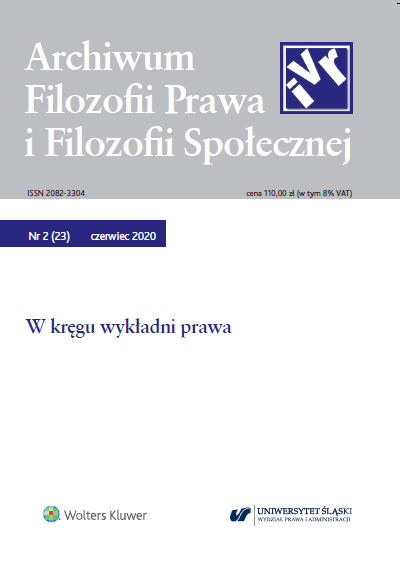
We kindly inform you that, as long as the subject affiliation of our 300.000+ articles is in progress, you might get unsufficient or no results on your third level or second level search. In this case, please broaden your search criteria.



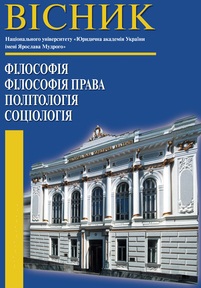
Problem setting. The problem is to investigate how the French legal philosopher Michel Villey (1914-1988) understood the exigency of “dialectics” in our understanding of legal philosophy and of legal doctrine, as well as in judicial activities. In the article we stressed that Villey used this exigency of “dialectics” on one side in a heuristic and practical setting of judicial activity in reference to language, and on the other, imposed the character “dialectics” as a philosophical emblem reserved to a specific philosophical tradition. As to the latter, Michel Villey used the exigency of “dialectics” to justify the conception of a natural law largely based on Aristotle and Saint-Thomas' philosophies and their legacies. The interrogation as to the “dialectic exigency” is thus simultaneously a legitimisation of how this conception of natural law comes to life, how it is functioning and what is the fondationalistic reasoning justifying it. The researcher, however, raises the question of whether we can understand this exigency otherwise, and more rightfully as just embedded in practical language analysis and in situated judicial communication. He answers this positively in showing that language is dialectics when understood as dialogue and sharing communicatively the world by means of language. He so turns the tables on Villey and this form of natural law theory in showing that if this is the case, then practical language understanding wholly takes care of the dialectic exigency. The researcher takes the stand for a legal philosophy which is neither positivist nor iusnatural if not simply modern and centred on the grammar of practical language. Recent research and publication analysis. The legal philosophy of Michel Villey has had a great influence around the world, especially in Catholic country or in Catholic settings. The number of translations of his articles and books around the world is impressive and remarkable! Since his death in 1988, we have seen an avalanche of studies and essays about the legal philosophy, the iusnatural conception of law, legal history, all embedded in M. Villey’s writing or taking a stand against it. The writings related to Michel Villey are growing, in his home country and in other countries. Two outstanding works have been entirely devoted to his philosophy: Renato Rabbi-Baldi Cabanillas, La filosofia juridica de Michel Villey [In Spanish] (Pamplona, Eunsa, 1989), and Stéphane Bauzon, Le métier de juriste. Du droit politique selon Michel Villey [In French] Québec, Les Presses de l’Université Laval, coll. Diké, 2002 (or in Italian: Il mestiere del giurista. Il diritto politico nella prospettiva di Michel Villey, Milano, Giuffré editore, 2001). The present study is entirely topical as to the way Michel Villey found his legal philosophy. Paper objective. To investigate, research and elucidate the meaning of the exigency of “dialectics” in the writings of French legal philosopher Michel Villey. Simultaneously, to give an alternative version and understanding of how this exigency can help us better understand how we write the philosophy of law or legal dogmatic.
More...
This paper examines Adolf Reinach’s views about negative states of affairs. The author briefly presents the history of the issue from the Middle Ages to the 20th century. The views of Reinach and Roman Ingarden are compared. A special focus is ascribed to the problem of omissions in the legal sense. According to the author, a proper solution to the problem of negative states of affairs locates negation at the level of language, not in reality.
More...
Is it possible to affirm the existence of eidetic a priori laws, if these laws can be contradicted by positive law propositions? How is it possible a deviation from a priori juridical propositions? These are the two questions to which the present paper “Deviation without contradiction in Adolf Reinach’s ontology” is devoted. The aim of the paper is to analyse the relations between a priori juridical propositions and propositions of positive law as investigated by Adolf Reinach. The Author presents and illustrates Adolf Reinach’s conception of conditioned a priori connections.
More...
We almost every day direct our actions with reference to social, moral or legal norms and oughts. However, oughts and norms cannot be perceived through the senses: how can we “grasp” them, then? Adolf Reinach distinguishes enacted norms and oughts created through a social act of enactment, from moral norms and oughts existing in themselves independently of any act, knowledge or experience. I argue that this distinction is not a distinction between two species of oughts within a common genus: it is rather a deeper ontological distinction between two modes of existence that are quite different, even though both are objective, according to Reinach. This ontological distinction is reflected in the way in which enacted oughts and moral oughts can be grasped, respectively: in the former case, the enacted ought is grasped by going back to the underlying social act from which it springs; in the latter, a “grasping through feeling” (fühlende Erfassen) of the moral values is implied.
More...
In the Logical Investigations, Edmund Husserl defines that which is normative as the objectively regular with its rules of regularity, which can be recognised rationally – normativity concerns the being itself and the rational cognition of the being (logic as a normative discipline establishing the rules of scientific knowledge, as the science of science). Instead, Adolf Reinach in The Apriori Foundations of the Civil Law defines the notion of norm as polysemantic and distinguishes the legal provisions (the prescriptive sentences), formulated within a given community, from the basic norms which are grounded in the objective (including moral) justness of the states of affairs. The obligation of the being and the obligation of acting exist in themselves, independently from cognition. In turn, “enactments and the propositions which express enactments” as a kind of normative sentences have the character of normalisation, but they require a person to pronounce them. The prescriptions realise and refer to what is objectively being and to the objectivity of what is being and obligatory. In my text, I present Reinach’s position on the relations between norms and provisions (as prescriptive propositions “which express enactments”) referring his theories to the Husserlian concept of normativity.
More...
When speaking about legitimizing law we can mainly mean analysis which concerns metaphysical justification for what is called the phenomenon of law. From the metaphysical point of view, the justification of law means indicating the foundation of its existence. It is about seeking (indicating) an esse (essence) basis of law, in line with the task set by the metaphysical analysis, namely seeking an answer to the question: Why does object X exist? And in the answer, there will appear a formula indicating the final reasons for its existence (ratio essendi). The same ideas that we can find in Adolf Reinach’s principal work, The Apriori Foundations of the Civil Law, provide a possibility of better understanding this important issue of legal philosophy, namely the question of legitimizing law (justifying law). The aim of this article is to present that argument.
More...
This contribution centers on the notions of property and nuda potestas in Reinach’s philosophy of law. I aim to demonstrate how both terms ground an important part of Reinach’s understanding of a priori condition for civil rights. Consequently, I assess the principle of property with a comparison to Luis de Molina, since he shows in his De Iustitia et Iure how dominium and rights justify some forms of property (lay and ecclesiastical) and political power (Molina 1659, disp2 n1; Kaufmann 2014, 129). Hence, the right of the person is discussed by following the potestas. In Die apriorischen Grundlagen des bürgerlichen Rechtes, Reinach implicitly refers to the nuda potestas, which is a kind of power that can be applied only formally and not in fact to something else and for that reason, it can only be caught a priori, since acts are performed by another person within it. This is the reason why the rights of a person can be divided between more people, and it is at first just a kind of property, which can be exercised upon the individual. Consequently, I divide my contribution as follows. First, in considering the social act, I show how its characteristics of Anspruch and Verbindlichkeit result from the commitment that human beings make to one another. In doing this, I discuss the particular condition of slavery through which it is possible to find the property and the nuda potestas since there is no enjoyment of the good to which it refers. Second, I apply both concepts by showing a parallel with Luis de Molina. This comes about in consideration of the case of dominium, in which absolute rights can be ascribed to their relative claim. Third and finally, I offer a critique of Reinach, in which I show how absolute rights and relative claims cannot be assimilated.
More...
Adolf Reinach met and befriended Hermann Kantorowicz in one of Lujo Brentano’s political economy seminars during the 1901/1902 academic year at the University of Munich. After Munich, Kantorowicz would go on to be a major contributor to the Free Law Movement (Freirechtsbewegung) in Germany and play an important role in the development of the sociology of law in the 20th century. Reinach encountered the work of Edmund Husserl while studying with Lipps and later became central to the phenomenological movement in Göttingen. But all the while he remained interested in and focused on issues related to justice. His last scholarly publication before leaving for battle in WWI, Die apriorischen Grundlagen des bürgerlichen Rechtes (The a priori Foundations of Civil Law, 1913) published in the very first edition of the Jahrbuch für Philosophie und phänomenologische Forschung (Yearbook for Philosophy and Phenomenological Research) is a testament to this. Here we see Reinach taking his phenomenological education and applying it to entities of justice. I believe Kantorowicz inspired this lasting interest in matters of justice. This essay will focus on the influence of Kantorowicz on Reinach, and while doing so attempt to flesh out and contrast the ways in which these two men sought to overcome the problems of justice (Recht) of their time. Many of these problems still continue to be relevant today.
More...
In his original phenomenology of law Adolf Reinach distinguishes among experiences the so-called “social acts”. These include acts directed towards other persons that require that the latter acknowledge the communicated contents and assume certain attitudes. Among these acts Reinach mentions there are promises, orders, requests and questions. He argues the promise is the special act that creates the a priori grounds of law. It is to be noted that Reinach’s phenomenology of law is of static character (in the Husserlian sense of the word) and therefore it shares all its advantages and disadvantages. In my paper I would like to draw attention to another social act, which can also be attributed to certain law-making activities, especially from the perspective of the genetic phenomenology. It is questioning. At the same time when Reinach was working on his theory of law, his Munich friend, Johannes Daubert (1877–1947), also a student of Theodor Lipps and a friend of Edmund Husserl, who together with Reinach made an “invasion of the Munichs at Göttingen”, worked on the first phenomenology of the question. Although he did not refer his research to the phenomenon of law, we can ask whether, like Reinach’s deliberations about promises and obligation, it cannot be done. That this is possible to some extent, for example, is evinced by the Hannah Arendt and Klaus Held’s phenomenology of the political world. He points out that the public world as such arises from the primordial openness of man, understood as “zoon politikon”. This openness might be interpreted as the question which is not so much a single act as it is an attitude. The purpose of the paper is to outline how, while starting with the phenomenological reflection over various types of utterances, one can specify their certain forms and the acts constituting them as well as the attitudes which allow for a priori grounding the phenomenon of law from the perspective of static and genetic phenomenology.
More...
The originality of Cossio’s works is expressed by a strong relationship between philosophy of law and his philosophical assumptions. The starting point for deliberating on law are widely recognized ontological and epistemological contentions. Cossio justifies his legal theses basing them on his philosophical views. Egology derives from Edmund Husserl’s phenomenology which is related to some elements of William Dilthey’s philosophy of culture. Martin Heiddeger’s and Immanuel Kant’s philosophies are the basis too. The first part describes Cossio’s ontologies of subjects otherwise known as regional ontologies. Methods for examining the above subjects and gnoseological acts are presented here too. The second part presents the characteristics of law as a cultural subject. The article is not only a report. Its aim is also to show that Carlos Cossio’s legal philosophy is semantic in character.
More...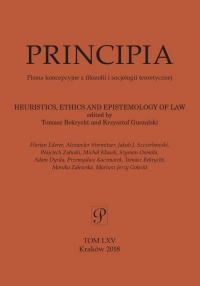
The article examines the cognitive, metaphorical dimension of the pure theory of law and demonstrates that Hans Kelsen used metaphorical language in his description of law, and unintentionally created a unique set of cognitive metaphors in order to make the theory of law focused on the abstract “Ought” world comprehensible. The paper argues that it would be impossible for Kelsen to describe norms without metaphors. The paper uses Lakoff and Johnson’s theory as a framework for the interpretation of this metaphorical aspect of the pure theory of law. Hence the following paragraphs will examine the cognitive context of the abstract categories crucial for the pure theory of law, such as: the category of Ought, imputation, basic norms and the dynamic (hierarchical) structure of law. This article is based on the position that an analysis of the cognitive dimension of the pure theory of law might yield promising results which could reveal new aspects of the central categories in this theory. This article is an attempt to explore the possibilities provided by merging these two theories and checking if the results brings some new knowledge about the pure theory of law and legal thinking in general.
More...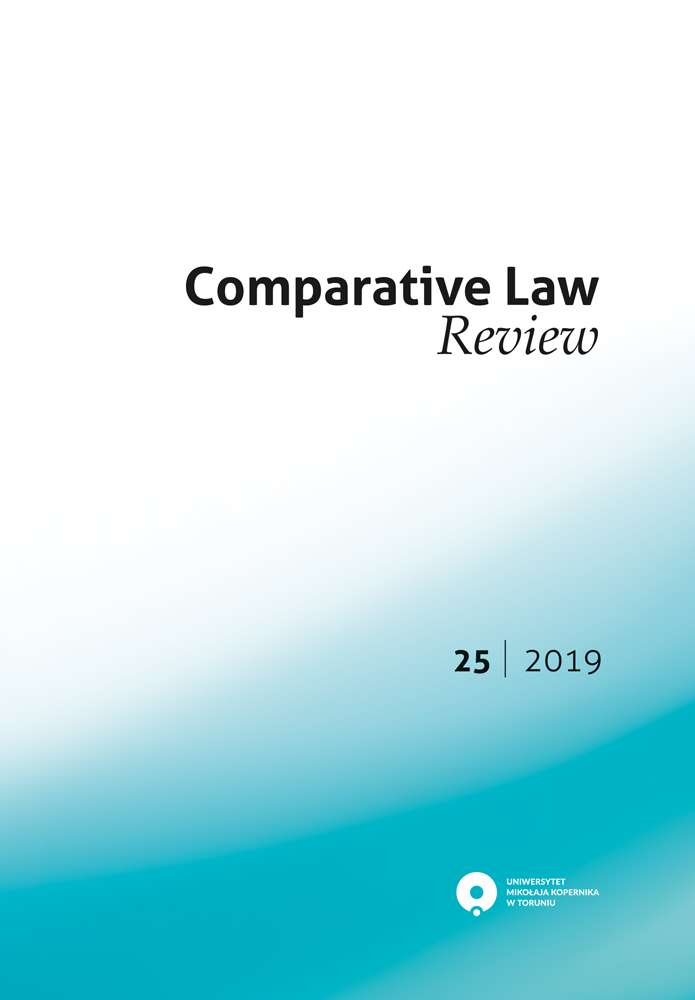
In the presented article we develop the thesis that constitutional courts may be treated as one of the key elements guaranteeing the proper functioning of representative democracy if they secure the democratic “chain of delegation”. Following the theory of Hans Kelsen, we employ a normative concept giving the answer to how a constitutional court should act to fulfil such a role. According to Kelsen’s perspective, the main threat to representative democracy is the “alternative legislative procedure”, a non-constitutional form of legislation based solely on the political will and in consequence deconstructing the constitutional chain of delegation. The guarantee of constitutionality means the restoration of an equal representation in the legislative procedure based on the majorityminority rule. As the guardian of the democratic legislative procedure, the constitutional court should be a ground for the “virtual representation” of all the parties to a democratic dispute. In result it prevents the transformation of representative democracy into majority democracy.
More...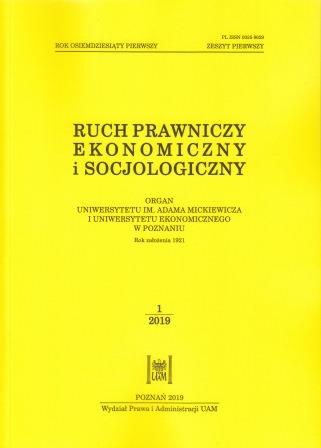
This article is Michał Dudek’s answer to the criticism articulated by Wojciech Ciszewski. In its first part it is noted, amongst other things, that Dudek and Ciszewski adopt different visions of the moral neutrality of law, or that they conduct analyses in a significantly different manner. It is also emphasized that Ciszewski frequently uses very idealistic, even counterfactual constructions and reads Dudek’s arguments erroneously. In the second part, Dudek, noticing Ciszewski’s very narrow critique of aligning law with morality, presents a more complete list of controversies connected with this postulate, including the problem of the incompleteness of morality, the diagnosis of morality, and the extension of the legislative process.
More...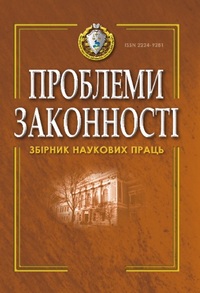
The article clarifies the general concept of «solution» in the theory of operational and investigative activities. It is concluded that the issue of tactical decision in the forensic literature has received much attention. At the same time, it should be noted that the relevant topics in the theory of operational and investigative activities are not properly reflected in the scientific literature, some developments on this issue, as noted above, are closed, and comprehensive research in this area has not been conducted. The essence and content of strategic and organizational decisions in the theory of operative-search activity are investigated and their correlation with tactical decisions in the theory of operative-search activity is determined. The main existing theoretical approaches to interpretations of the concept of «tactical solution» in criminology and the theory of operational and investigative activities are analyzed, based on the analysis formulated own definition of «operational and tactical solutions» which should be understood as the result of intellectual (mental) activity of the operational unit. to a certain conclusion (choice), based on the analysis and assessment of the operational and tactical situation, which involves the formulation(setting) of the goal (objectives), which must be achieved through the solution of specific operational and tactical (intermediate) tasks.A thorough analysis of the scientific literature made it possible to classify operational and tactical decisions according to the following main criteria (features): by form of expression: oral; written(documented); by subject of acceptance: independent; collective; by the nature of the tactical tasks to be solved: simple; complex. It is emphasized that according to its meaningful reflection (content) the operational and tactical decision must be: legal, reasonable, timely, optimal and realistic to implement.
More...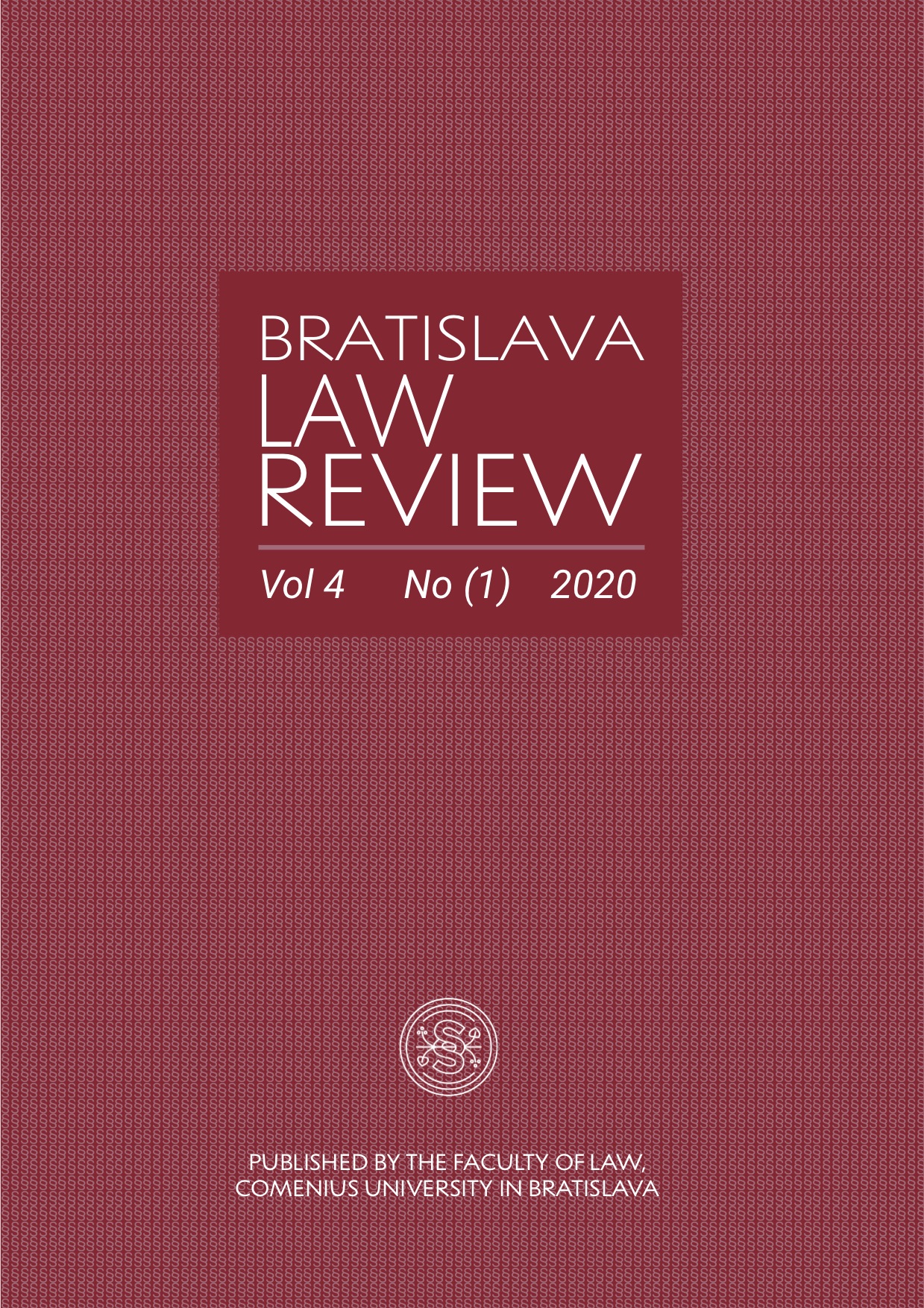
The paper summarizes philosophical, historical and doctrinal background of the differentiation between mandatory and default rules in private law in general and in company law in particular. The conclusion of the author is the plea to provide for a clear guidance in the respective doctrine and legislation as to the criteria and principles applicable to distinguishing between the two types of regulations.
More...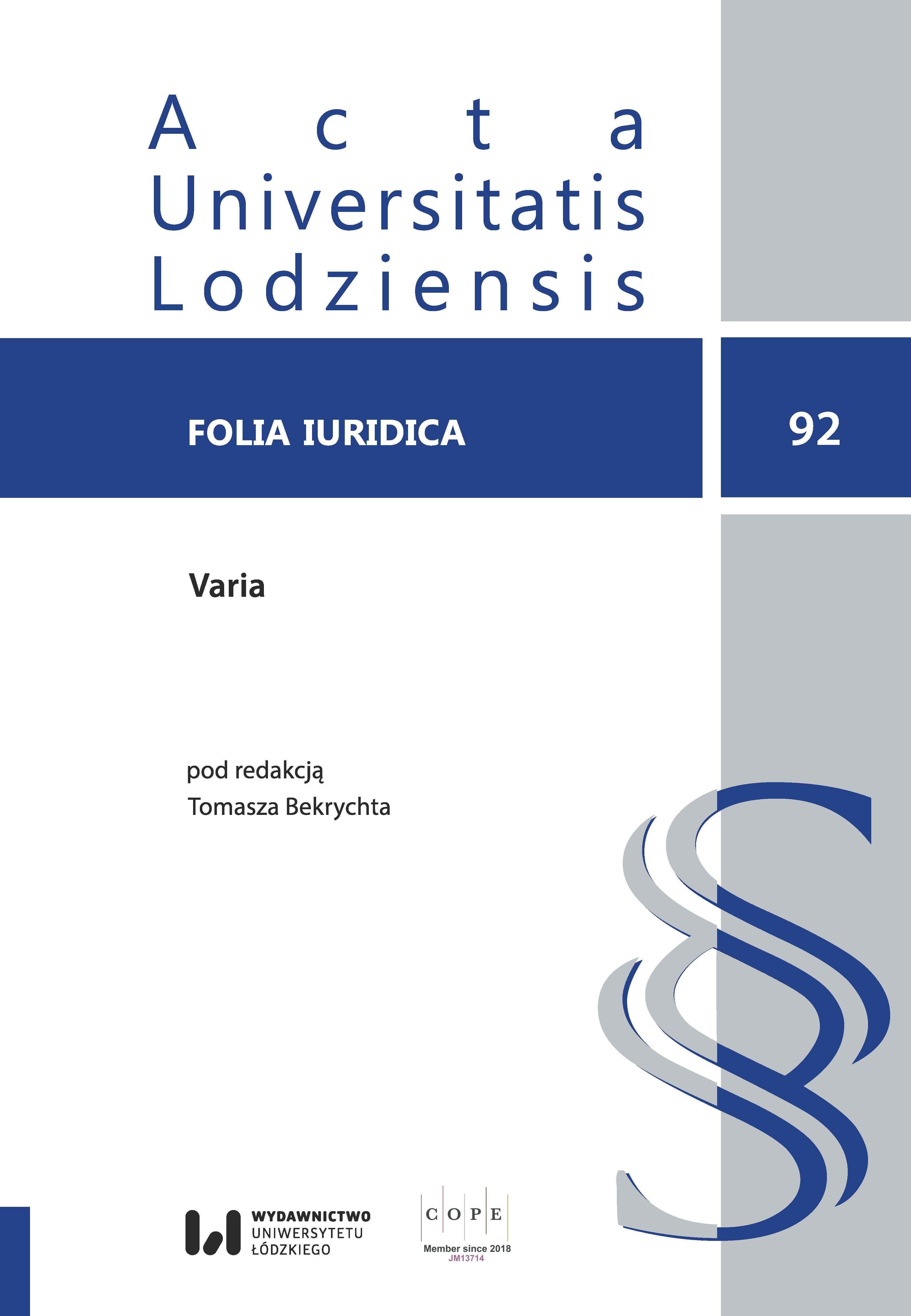
Each lawful audit centers on discovering truth. Often times, revealing facts is far from ideal and entails some kind of truth creation, called by the author “the audit truth”. The audit statements of facts create their own normative and semantic reality. The audit truth is always to some degree subjective, uncertain, approximated and simplified. Nonetheless, it does not make it false. Imperfectness of reality’s description is hard to avoid. As such it has to be accepted only if it meets certain standards of discovery and description. The article, by revealing the nature of the audit truth, fills the gap in the literature that so far has been focused on the principle of the material truth as an ideal goal for auditors. The author argues that pursuing truth in audit deserves advanced and systematic studies by audit philosophy.
More...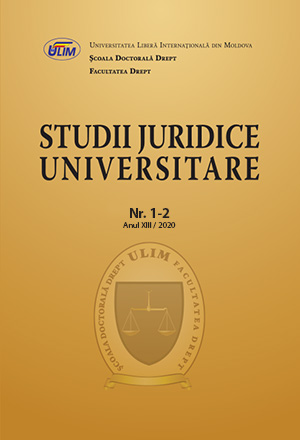
This paper analyzes the right to information from its inception to the present day. The importance of studying the Genesis, transformation and current trends in the development of the right to information is important for understanding the essence and directions of development of this right, which has acquired special importance in the digital environment.
More...